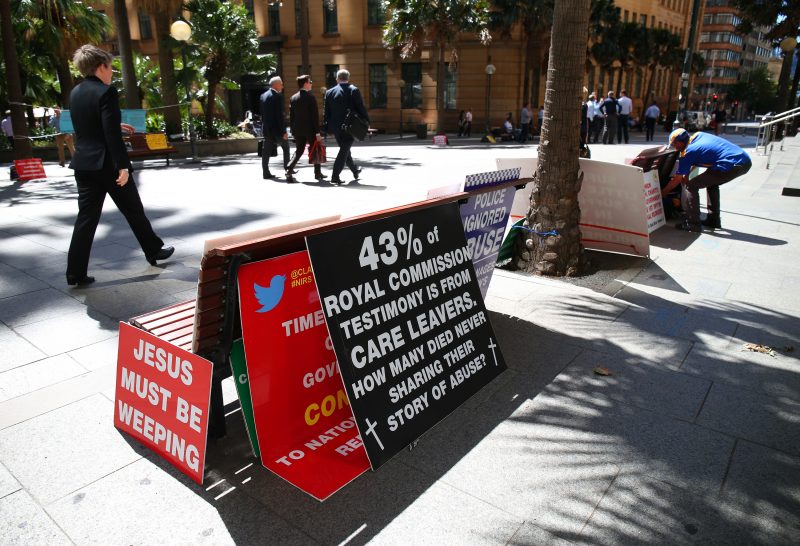A New Zealand Catholic Church official has suggested that priests accused of sex abuse would be better dealt with regionally, rather than their cases being referred to Rome.
Bill Kilgallon, the national director of the National Office for Professional Standards in New Zealand, was one of several members of the Pontifical Commission for the Protection of Minors to appear before a hearing of Australia’s Royal Commission into Institutional Responses to Child Sexual Abuse on February 23 in Sydney.
Mr Kilgallon responded to an invitation to comment on how well the process of referring accused Catholic priests to the Congregation for the Doctrine of the Faith works.
He described the process as “slow”, adding that “there are systems that could be improved considerably”.
“It could be dealt with regionally instead of everything being sent to Rome.”
Mr Kilgallon noted that “a region — Australia, New Zealand, Pacific Islands, PNG and the Solomon Islands — as a group, for example, and do it regionally and have some expertise attached to that”.
He cautioned that about the risk “that regions would not do it well, but the CDF could have the auditing role rather than the doing role, and that would, I think, be more effective”.
According to the US National Catholic Register, since 2001, the Congregation for the Doctrine of the Faith has had responsibility for dealing with and judging very serious canonical crimes such as clerical sex abuse cases.
In most cases, once an accusation of sexual abuse involving a minor is levelled against a priest, his bishop and others conduct a preliminary investigation to establish whether the allegation has “the semblance of truth”. If it does, the case is immediately referred to the CDF, which decides whether the CDF will handle it or send it back to the bishop.
The CDF also decides whether there will be a trial or an administrative procedure, which usually involves less complex cases.
The office, through its promoter of justice, also monitors the procedures that national bishops’ conferences have in place for dealing with abuse accusations and handling the dismissal from the priesthood of those guilty of sexual abuse.
Mr Kilgallon’s comments to the Sydney hearing came only a few days before the resignation of Irish abuse survivor Marie Collins from the pontifical commission took effect.
Ms Collins handed in her resignation on February 13 and it took effect on March 1. She resigned over what she described as resistance coming from Vatican offices against
implementing recommendations from the pontifical commission, despite these recommendations having been approved by the Holy Father.
In an editorial on the US National Catholic Reporter website, she cited “a lack of cooperation, particularly by the dicastery most closely involved in dealing with cases of
abuse”, which commentators have identified as being the Congregation for the Doctrine of the Faith.
In her NCR editorial, Ms Collins said the pontifical commission’s template of safeguarding guidelines was never sent out to the world’s bishops’ conferences for helping them craft or improve their own policies and “the dicastery, which has the responsibility for reviewing existing bishops’ conference policy documents and which has its own template, is refusing to cooperate with the commission on the combining of the work”.
Again, she was referring to the CDF. The last straw for Ms Collins, which led to her resignation, was when she learned that the same dicastery that refused to cooperate on the safeguarding guidelines had also refused “to implement one of the simplest recommendations the commission has put forward to date”.
The recommendation, which the Pope instructed that all Vatican departments follow, asked that every Vatican office “ensure all correspondence from victims/survivors receives a response.
I learned in a letter from this particular dicastery last month that they are refusing
to do so”, she said.
Mr Kilgallon chairs the pontifical commission working group on guidelines.
Mr Kilgallon also told the royal commission hearing in Sydney that he has asked one of the pontifical commission’s working groups to request of the Pope that Church law be changed so as to do away with the statute of limitations on sexual abuse cases.
Currently the statute of limitations is 20 years, “which can be dispensed with on a case-by-case basis and usually is”, Mr Kilgallon said.
He observed that “the statute of limitations, in my experience, is a great disservice to those who have been abused. It does nothing for them. It only serves to protect the organisation and sometimes the abuser.”
The three week hearing by the royal commission (case study 50) was an examination of why historical child sexual abuse was so prominent in the Catholic Church and the changes put in place by the Church in recent years to respond to abuse and better protect
children.

Reader Interactions